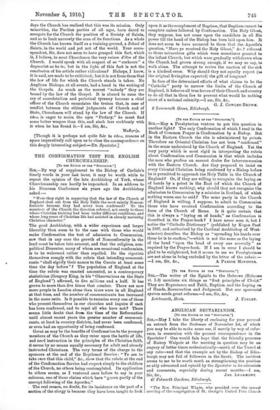THE CONFIRMATION TEST FOR ENGLISH CHURCHMANSHIP.
[TO TKE EDITOR OF TEl " SPZCTAT011.1
SIR,—By way of supplement to the Bishop of Carlisle's timely words in your last issue, it may be worth while to repeat the opinion of the late Archbishop of York, whose Churchmanship can hardly be impeached. In an address to his Diocesan Conference six years ago the Archbishop asked :-
•
Were they right in supposing that the law of the Church of England shut out from the Holy Table the most saintly Noncon- formists because they had never been confirmed? To the members of the Church the direction referred, not surely to those whose Christian training had been under different conditions, and whose long years of Christian life had assisted in already maturing Christian character."
The good Archbishop, with a wider experience and larger liberality than seem to be the case with those who would make Confirmation the test of admission to Communion, saw that in any case the growth of Nonconformity in the land must be taken into account, and that the religious, non- political Dissenter, many of whom are occasional conformists, is to be welcomed rather than repelled. Do the rigorists themselves comply with the rubric that intending communi- cants "shall signify their names to the Curate at least some time the day before " ? The population of England at the time the rubrics was enacted amounted, as a contemporary statistician (Gregory King, in his "Observations on the State of England ") affirmed, to five millions and a half. It has grown to more than five times that number. There are now more people in London alone than there were in all England at that time, and the number of communicants has increased in the same ratio. Is it possible to examine every one of those who present themselves in our churches and inquire if each has been confirmed, and to repel all who have not? There seems little doubt that from the time of the Reformation until almost recent years the greater number of eommuni- cants, at least in country districts, had never been confirmed, or even had an opportunity of being confirmed.
Great as may be the benefits of Confirmation to the younger members of the Church as they enter upon the battle of life, Ind need instruction in the principles of the Christian faith,
it seems by no means equally necessary for adult and already instructed Christians. The very terms of the charge to the sponsors at the end of the Baptismal Service : "Ye are to take care that this child," &o., show that the rubric at the end
of the Confirmation Service had respect simply to the children of the Church, no others being contemplated. Its application to others seems, as I ventured once before to say in your columns, one of those claims which have "grown partly of the corrupt following of the Apostles."
, The real reason, no doubt, for its insistence on the part of a section of the clergy is because they have been taught to look upon it as the complement of Baptism, that Baptism cannot be complete unless followed by Confirmation. The Holy Ghost., they suppose, has not come upon the candidate in all His power till the hand of the Bishop has been laid upon him. It does not seem to have occurred to them that the Apostle's question, "Have ye received the Holy Ghost," &c. ? referred to those miraculous gifts which were sometimes granted to the infant Church, but which were gradually withdrawn when the Church had grown strong enough, if we may so say, to walk alone. The attempt to revive the unction of the sick is a kindred error. Why should they not equally expect (as the original Irvingites expected) the gift of tongues ?
In face of the determined efforts of what claims to be the "Catholic" party to narrow the limits of the Church of England, it behoves all true lovers of their Church and country to do all that in them lies to prevent what would be nothing short of a national calamity.—I am, Sir, &c.,


































































 Previous page
Previous page